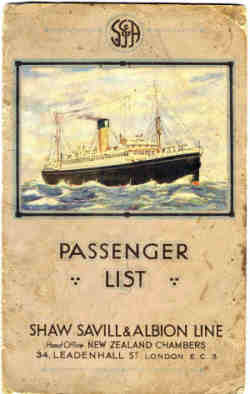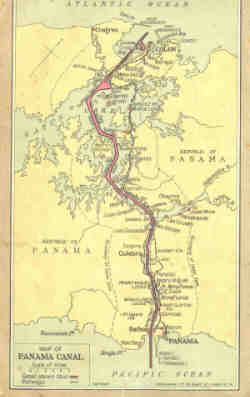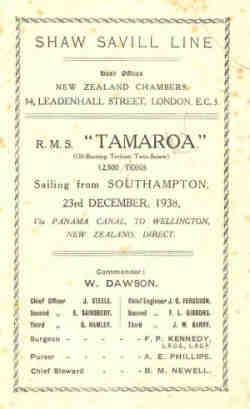| BILL McMaster |
|
Aruba. |
| I cannot say the exact
date when my family first arrived in Aruba and those who could have told
me have now unfortunately passed on. |
| However I can say that
my father commenced working for Lago Shipping Company in June 1927,
though it is possible that he was in the Caribbean area before that
date. |
| Both my parents came
from a small peninsula on the East Coast of Northern Ireland, called
Islandmagee – where at that time every eldest male son inherited the
family farm and it was left for the younger siblings to seek their
fortunes elsewhere. The majority tended towards seafaring and at this
time, most British ships had at least one crewmember from that place
sailing onboard, as in that period during and after the great
depression, making a living on the land and indeed elsewhere was very
difficult. |
| My grandfather was a
shipmaster - as was his father before him - and had been born on the
small family farm. My grandmother, in addition to raising the inevitable
children, who ultimately numbered eleven in total, that arrived
regularly after his vacations, worked this - cows for milk & butter,
hens for eggs and eating, and a large vegetable garden for all the
family. It is also possible that adult relatives helped, or casual
outside labour was hired, as necessary for ploughing and cutting grass
and making hay for winter cattle feed. Undoubtedly all of the growing
children helped with the chores as much as they could, both before and
after school and during the school holidays. |
| My grandfather served in
a foreign going sailing vessel as Chief Mate from 1887 and then Captain
between 1891 until 1893. One of my aunts described how the family
existed in those days before social security, during his long periods
away at sea. |
| This sailing ship, the
Braque Polly Woodside, the 1885 product of another Belfast shipyard,
sailed around the world. Its voyages took it from Europe to the West
coast of South America on the nitrate trade, to Australia and New
Zealand for grain and wool. In 1904 it then was sold to New Zealand then
Australian owners before finally being used as a coaling hulk, then in
1922 being left to rot, falling victim to the onslaught of the
steamship. |
| Much later it was
recognized as one of the last vessels of its type and was extensively
rebuilt and brought back from a decaying hulk in 1987 and is now on
permanent display in a park beside the Yarrow River in Melbourne,
Australia. |
| A small history of my
grandfather, during his time onboard, including pictures, is included in
a book entitled "The Braque Polly Woodside (Rona) by Vin Darroch, an
Australian, who was involved in collecting information on the ship and
also involved in its reconstruction. The book is long out of print,
however I have recently managed to obtain a second-hand copy from that
country. |
| The more famous Belfast
shipyard of Harland & Wolff in 1925 received its first order to build
four shallow draft tankers from Lago Shipping Co. These ships and
sixteen subsequent orders that were built at that shipyard were
originally managed and crews supplied by Andrew Weir of Glasgow. With
new ships coming off the slipway, crew were needed and I can only assume
that is how my Father went to Venezuela. Bearing in mind at this time
certificated captains sailed as AB’s and ordinary seamen were unable to
get positions on ships. |
| Certainly there are
photographs in our house (some of which I have included) showing him on
various "lakers" along with various cousins - Islandmagee was also a
place where everyone was related to everyone else, and the news would
spread rapidly by word of mouth, of the opportunities to had in the West
Indies. |
| At one time the
following people from Islandmagee worked there and were my fathers
cousins; Capt. Jimmy Kerr, Tom Mann, Capt. Hugh Jackson, Samuel M. Kane.
Captain John Kane also from the same place was not a relation. |
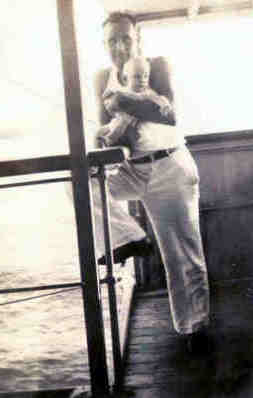
My
parents married in 1932 and soon after, my mother moved to Maracaibo,
where I was born in 1935.
Another
photograph shows me being carried by my Father on the bridge of a ship.
On the back is written " Bill at four
months old, on his first trip". I believe this vessel to be the s.s.
Invercorrie. It may also explain why I too, followed in my father’s
footsteps and chose seafaring as a career. |
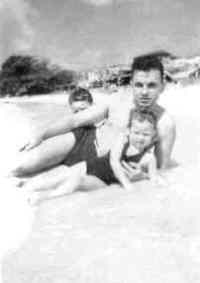 Another relative - this time of my
mothers, though by marriage, was James (Paddy) Young - Norman &
Kenneth’s father. He was third engineer on one of the "lakers",
torpedoed on 14th February. A non-swimmer and a very brave
man, he gave his lifejacket to the Chief Engineer – also a non- swimmer
when they abandoned ship, but managed to survive although badly burnt.
He never returned to the fleet, but when recovered from his wounds,
worked for the marine department within the harbour. Because of shore
based work he was a frequent visitor to our bungalow. He taught my
sister and I to swim, gave me extra tuition in math to try and improve
my grades – he probably did not realize how difficult a task he was
letting himself in for. He also had the unenviable task of telling me
that my Dad had been killed in September 1944. Another relative - this time of my
mothers, though by marriage, was James (Paddy) Young - Norman &
Kenneth’s father. He was third engineer on one of the "lakers",
torpedoed on 14th February. A non-swimmer and a very brave
man, he gave his lifejacket to the Chief Engineer – also a non- swimmer
when they abandoned ship, but managed to survive although badly burnt.
He never returned to the fleet, but when recovered from his wounds,
worked for the marine department within the harbour. Because of shore
based work he was a frequent visitor to our bungalow. He taught my
sister and I to swim, gave me extra tuition in math to try and improve
my grades – he probably did not realize how difficult a task he was
letting himself in for. He also had the unenviable task of telling me
that my Dad had been killed in September 1944. |
|
Even after we returned to Northern
Ireland, during his vacations home, he took time to take me shooting:
ducks in the winter, rabbits and pigeons during summer ones and fishing.
He also took me to watch the Ulster Grand Prix motor races and
motorcycle TT races whenever possible. My Mother, sister and I owe him a
great debt of gratitude for the many kindness he showed to our family. |
|
During a vacation home to Ireland in late
1937, my mother again found herself pregnant but remained there until
after the birth of my sister in April 1938. I do not know why she
remained there until December that year but I now write with certainty,
because on December 23rd. 1938 the Shaw Savill & Albion Line
twin screw steamer, the s.s. Tamaroa sailed from Southampton; amongst
those shown in the passenger list are Mrs. A. A. McMaster, Master
William McMaster and Miss Pamela McMaster. (See attached copies of the
Shaw Saville & Albion passenger list), all scheduled to disembark at
Curacao. This vessel a 12,500 gross ton mail steamer, called at Curacao,
then transited the Panama Canal on its way to New Zealand. What date we
arrived at Willemstad, Curaçao and how and when we were transported to
Aruba I cannot say, but certainly sometime in early January 1939. |
|
|
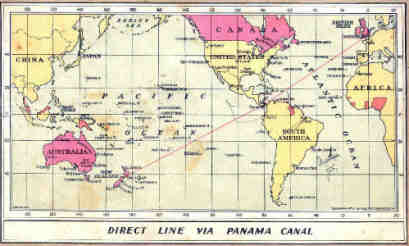 We
lived at #717 from then until our departure from Aruba late 1944 after
my dad was killed following a collision between his ship, the "Punta
Gorda" and the s.s. Ampetco on September 20th. We
lived at #717 from then until our departure from Aruba late 1944 after
my dad was killed following a collision between his ship, the "Punta
Gorda" and the s.s. Ampetco on September 20th.
CABIN CLASS PASSENGERS ~ continued.
Disembarking
CURACAO-continued.
Mr. C. Lockwood
Mrs. A. A. McMaster
Master W. McMaster
Miss P. C. McMaster
Mrs. K. L. Newman
Mrs. G. Partridge |
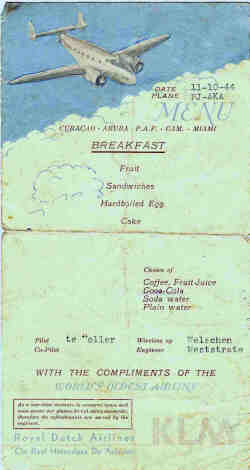 |
I know we
left the “Rock” by a KLM flight on 11.10.1944 on aircraft PJ-
AKA,
Pilot - te Koller
Co-pilot
- unnamed
Engineer – Weststrate
Wireless operator - Welschen
calling at Port au Prince
and Camaguay in Cuba and thence
to Miami. |
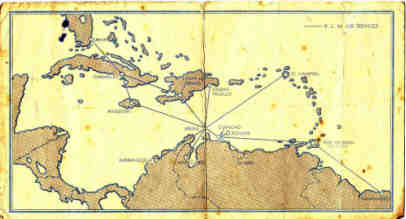 |
|
|
I know we left the "Rock" by a KLM flight
on 11.10.1944 on aircraft PJ- AKA, with Pilot - te Koller, Co-pilot -
unnamed, Engineer – Weststrate, Wireless operator - Welschen, calling at
Port au Prince, Camaguay in Cuba and thence to Miami.
|
| My days in Aruba were
some of the happiest of my life. A tropical island paradise, with no
winter weather, an ideal place for children with few natural hazards. At
first, free from the horrors of war that was beginning to ravage Europe
at that time. |
| It was a time of long
summer holidays spend at the beach, complete with swimsuit and towel and
the ever essential book of club tickets for drinks and ice cream at the
Esso Club, with non-stop swimming, diving from the "T" dock into the
warm tropical waters, protected by a lagoon and shark nets. Of finding
the body of a shark on the reef. A very sobering moment. |
| However there were
incidents, fractures to left collar bone, right collar bone and right
wrist – all in quick succession causing my mother, anxiously, to ask a
doctor at the hospital if I suffered from brittle bones. He replied "No
– just unlucky". A little while later I was almost even more unlucky.
|
| When in a temporary
house, ours being painted; I ran from behind the school bus at
lunchtime, without looking and was struck by a passing car. This time –
undamaged but obviously in shock, I freed my self from the front of the
car, sprinted across the road, up the steps, through the kitchen – past
my startled mother, into the bedroom and hid under the bed. The unknown
driver who’s quick braking saved my life pursued me, to see if I had
been hurt. His rushed arrival in the kitchen at the run, "had she seen a
little boy run past", a quick explanation then both adults following me
into the bedroom and finally finding me under the bed. |
| Comical now, but at the
time could have ended more seriously. |
| Of Christmas parties at
the Marine Club, with a large decorated tree, a real Santa with
gaily-wrapped presents for every child. |
| And then in February
1942, of watching the night sky, red with burning oil from tankers that
had been torpedoed at the reef, and going to the top of the hill
overlooking the church to see the cause. My fathers cousin Samuel M.
Kane being one of those lost when the s.s San Nicolas was torpedoed that
February day. |
| Later after the islands
defenses were bolstered by the arrival of American forces, my sister and
I, joining other young school friends and going up to the army camp
early Saturday and Sunday mornings and inserting our selves,
nonchalantly into the chow line for breakfast. And of begging shoulder
badges and equipment from the ever patient and congenial friendly
soldiers. |
| I can remember only one
of my teachers. Miss Myrtle Parham being the one who sticks in my memory
and strangely enough, the teacher sitting at the back of that classroom
photograph of the third grade, taken in 1944. |
|
Since our departure, I have been back to
the island many times. The first time in November 1953 during my first
year at sea when we called at San Nicolas to load a cargo of oil for
Europe. In 1957 I was there many times and again in 1972, the last time
being in 1993 when the refinery was being re-commissioned and operated
by Coastal. |
|
I still have to fulfill a promise to my
wife that I would take her there to show her my childhood home.
|
|
Probably not this year but certainly
before very long. |
|
CLICK HERE TO GO
TO BILL McMaster's SCRAPBOOK |

 Another relative - this time of my
mothers, though by marriage, was James (Paddy) Young - Norman &
Kenneth’s father. He was third engineer on one of the "lakers",
torpedoed on 14th February. A non-swimmer and a very brave
man, he gave his lifejacket to the Chief Engineer – also a non- swimmer
when they abandoned ship, but managed to survive although badly burnt.
He never returned to the fleet, but when recovered from his wounds,
worked for the marine department within the harbour. Because of shore
based work he was a frequent visitor to our bungalow. He taught my
sister and I to swim, gave me extra tuition in math to try and improve
my grades – he probably did not realize how difficult a task he was
letting himself in for. He also had the unenviable task of telling me
that my Dad had been killed in September 1944.
Another relative - this time of my
mothers, though by marriage, was James (Paddy) Young - Norman &
Kenneth’s father. He was third engineer on one of the "lakers",
torpedoed on 14th February. A non-swimmer and a very brave
man, he gave his lifejacket to the Chief Engineer – also a non- swimmer
when they abandoned ship, but managed to survive although badly burnt.
He never returned to the fleet, but when recovered from his wounds,
worked for the marine department within the harbour. Because of shore
based work he was a frequent visitor to our bungalow. He taught my
sister and I to swim, gave me extra tuition in math to try and improve
my grades – he probably did not realize how difficult a task he was
letting himself in for. He also had the unenviable task of telling me
that my Dad had been killed in September 1944.  We
lived at #717 from then until our departure from Aruba late 1944 after
my dad was killed following a collision between his ship, the "Punta
Gorda" and the s.s. Ampetco on September 20th.
We
lived at #717 from then until our departure from Aruba late 1944 after
my dad was killed following a collision between his ship, the "Punta
Gorda" and the s.s. Ampetco on September 20th.

